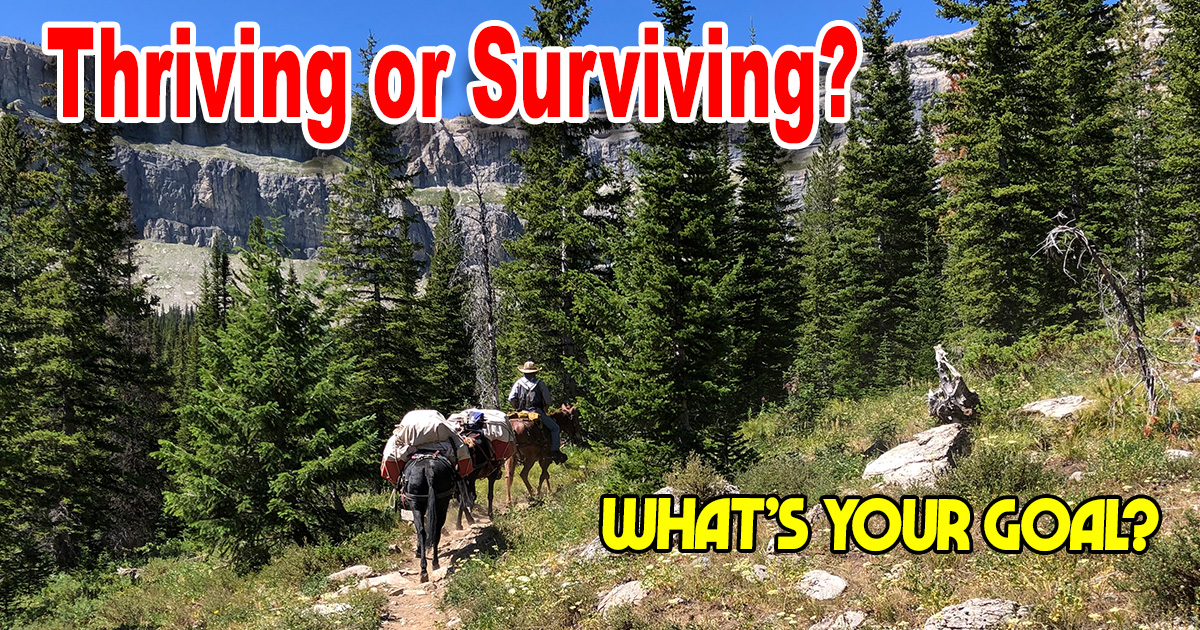Are we thriving or simply surviving while trail riding or camping with our horses?
The differences between thriving and just surviving, whether on the trail or in camp, often boil down to two very different approaches or mindsets, which can significantly affect you and your friends and families, overall safety, and enjoyment of the adventure.
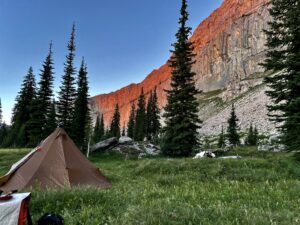
In a world where popular television programs often glamourize survival, I have a very different goal. When I’m enjoying the backcountry with my mules, my yearning is not to endure but to embrace every moment and thrive. Thriving and pursuing readiness and preparedness, although not a flashy spectacle for prime time, helps ensure that the memories of our journeys are ones of joy and delight.
Thriving
Thriving: Thriving refers to surpassing merely meeting the bare necessities for survival and actively seeking ways to enhance the experience and well-being of everyone during the trip. When you’re thriving, you’re not solely focused on surviving day-to-day challenges but also aiming to make the most out of your time, whether in a backcountry wilderness area or a front country camp.
Here’s how thriving might manifest itself in the context of preparing for a trail ride or horse camping trip:
Preparation: Thriving involves thorough planning and research. Trail riding and horse camping trips begin long before the trailer rolls out of the driveway. Thrivers carefully consider factors like trail routes, weather conditions, terrain, and horse care, in addition to being ready to ride and control their animal(s). Thrivers gather maps, trail guides, and weather forecasts to ensure they’re well-informed before setting out.
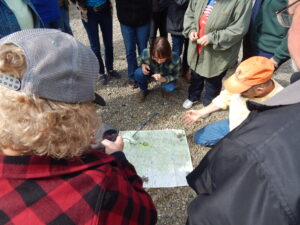
Skill Development: Thriving individuals invest time in learning and honing essential outdoor skills. They make the time and effort to learn the skills of navigation, horse handling, and first aid (both human and equine). Thrivers build their skills steadily. By equipping themselves with diverse skill sets, they are much better prepared to navigate challenges and unexpected situations.
Equipment and Supplies: Thrivers prioritize the quality of their gear and equipment. They carefully select well-fitting tack and quality equipment. They invest in weather-appropriate clothing that works as opposed to looks good in a western-themed store. Thrivers understand that the right tools will enhance their comfort and safety and that having good equipment isn’t enough. Thrivers also know how to use their gear appropriately and how to improvise when necessary.
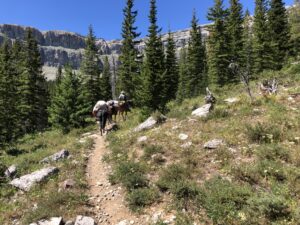
Exploration: Thriving goes beyond the beaten path. Thrivers take the time to appreciate and immerse themselves in the natural beauty of the outdoors. They seek out new trails, scenic viewpoints, and hidden gems. By embracing exploration, they deepen their connection with nature and their surroundings.
Camaraderie: Thriving individuals understand the value of connections. They build bonds with fellow travelers and their horses. Sharing experiences, stories, and laughter fosters a sense of camaraderie that enriches the journey and creates lasting memories.
Adaptability: Challenges are an inevitable part of any wilderness trip. Thriving means approaching these challenges with a positive attitude and a problem-solving mindset. Thrivers draw on their skills and resources to adapt and overcome obstacles, turning potential setbacks into valuable learning experiences.
Surviving
Just Surviving: On the other hand, just surviving implies a more minimalistic approach, focusing primarily on meeting basic needs.
While this approach might be appropriate in emergency situations, it can lead to a less fulfilling and potentially more challenging experience during an outdoor wilderness horse trip.
Minimal Planning: Just surviving may involve less comprehensive planning and research. Survivors may take considerations such as trail length and time into account, but other factors like weather and terrain could be overlooked.
Limited Skill Set: Those focused on surviving might rely on a basic understanding of outdoor skills and horse care. While they may have the essentials, they might miss out on the benefits of more advanced skills that could enhance their trip.
Inadequate Equipment: Individuals just surviving might opt for budget-friendly gear or supplies, or worse gadgets promising “quick fixes.” While this approach saves money, it could result in discomfort, reduced safety, or difficulties in managing unexpected situations.
Limited Exploration: Just surviving might involve sticking to well-known and well-trodden paths. While this approach ensures a certain level of safety, it can also mean missing out on the opportunity to discover lesser-known, picturesque spots.
Isolation: A focus on survival might lead to limited social interactions. While interactions with fellow travelers may still occur, they may not be as meaningful or fulfilling, potentially resulting in a more isolated experience.
Stress and Struggle: Without the tools and mindset to handle challenges effectively, those focused on surviving might experience more stress and difficulties. Lack of preparation can lead to unnecessary struggles when facing unexpected obstacles.
Benefits of Thriving
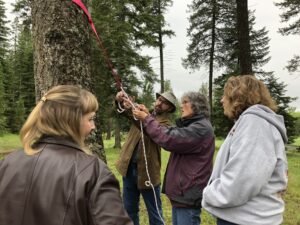
The distinction between thriving and surviving during a trail ride or horse camping trip hinges on one’s approach. Thriving encompasses proactive preparation, skill cultivation, and a willingness to fully embrace the journey. Those who thrive go beyond the essentials and invest time in mastering outdoor skills, fostering a deep connection with their horses and the wilderness. This approach not only enhances safety but also results in a richer and more fulfilling experience. Individuals who thrive immerse themselves in the beauty of their surroundings and create lasting memories.
On the other hand, mere survival centers on fulfilling basic requirements without actively pursuing more significant personal growth or enrichment. While survival certainly has its place in emergencies, it tends to focus on short-term goals and immediate needs. Those who adopt a survival mindset miss out on the profound joys of fully immersing themselves in the journey.
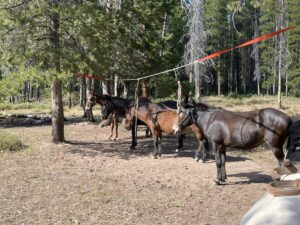
Despite what some popular television programs may suggest, surviving isn’t enough. When I’m with my mules in the backcountry, I don’t want to “survive.” I want to thrive and have the very best time possible. Being prepared may not make for a prime-time “reality” show, but it ensures that the memories will be pleasant.
For more functional information about trail riding and camping with horses and the world’s largest and most comprehensive guide to horse trails and camps, visit us at www.TrailMeister.com. You can also check out my best-selling book, “The ABCs of Trail Riding and Camping with Horses,” on Amazon.


